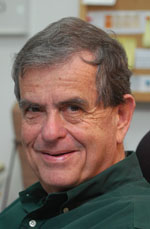Aaron Ciechanover, MD, PhD, the Distinguished Research Professor at Technion-Israel Institute of Technology in Haifa, Israel, and co-recipient of the 2004 Nobel Prize in chemistry for his contributions to the discovery and description of a process cells use to discard unwanted proteins, will give a special seminar at Washington University in St. Louis Friday, April 27.

His lecture, “The Ubiquitin Proteolytic System: From Basic Mechanisms Through Human Diseases and on to Drug Development,” will take place at 4 p.m. in the Laboratory Sciences Building, Room 300. The seminar is free and open to the public. A reception will follow.
Sixty years ago, Ciechanover says, body proteins were thought to be essentially stable molecules subject only to minor wear-and-tear, and the proteins we ate were thought to function solely as energy-providing fuel with little or no connection to body proteins.
We now realize, he says, that intracellular proteins turn over extensively, that the process is highly specific in most cases, and that the stability of many proteins is regulated individually and can vary under different conditions.
Regulated proteolysis serves numerous physiological functions, including maintaining the cellular quality control (by removing impaired proteins) and controlling essential processes (by removing, in a programmed and timed manner, different cellular regulators).
Ciechanover and his fellow laureates discovered the ubiquitin-proteasome system that removes damaged or unneeded proteins from the cell. The system marks proteins for destruction by tagging them with a small protein found in all cells called ubiquitin.
Once a protein has accumulated a chain of ubiquitin molecules, it is bound by the proteasome, the cell’s waste disposal system, which unfolds the protein and chops it up into building blocks to be used for the synthesis of new proteins.
Not surprisingly, aberrations in protein breakdown have been implicated in many diseases, among them many cancers, neurodegenerative diseases (Alzheimer’s, for example) and infectious and inflammatory diseases.
As a result, many pharmaceutical companies and research laboratories now are looking at the ubiquitin system as a target for novel drugs. One drug already on the market combats multiple myeloma, a form of blood cancer.
Ciechanover was born in Haifa, Israel, in October 1947, one month before Israel was recognized by the United Nations as an independent state. His parents had emigrated from Poland with their families as adolescents in the mid-1920s.
From his early days at home, he says, he remembers a strong encouragement to study. While his home was not a rich one, it had a huge library, and his parents had a great collection of classical music. He remembers that Bizet’s Carmen occupied more than 20 RCA 78-rpm bakelite records.
Even as a child, he was fascinated with biology. He collected flowers on Mount Carmel and dried them in his older brother’s heavy Babylonian Talmud. “I will never forget his rage on discovering my love of nature hidden within the pages of the old Jewish tracts,” he says.
Biology at the time was a largely descriptive discipline. Ciechanover remembers the effort invested in memorizing the 12 differences between the frog and the toad or between the circulatory systems and skeletal structure of the cat and the dog.
Since chemistry and physics appeared to him to be strong mechanistic disciplines built on solid mathematical foundations, he had a deep feeling that the future somehow resided in biology and in deciphering basic mechanisms, about which so little was then known.
“Yet the complexity of biological and pathological processes looked to me enormous,” he says, “almost beyond our ability to grasp, and I was intimidated.”
At first he pursued the safer route of training as a medical doctor, only to discover that medicine was even more descriptive than biology, and that because the understanding of disease was so shallow, doctors treated symptoms rather than causes.
In the end, he yielded to his attraction to the “magical and enchanting” field of biochemistry, abandoned medicine and enrolled in graduate school to begin a career in scientific research.
Between 1987-2001, Ciechanover repeatedly was a visiting professor at Washington University’s School of Medicine. In 2006, the university awarded him an honorary doctor of science degree.
For more information, contact Cindy Goessling at cgoessling@wustl.edu or (314) 935-9236.